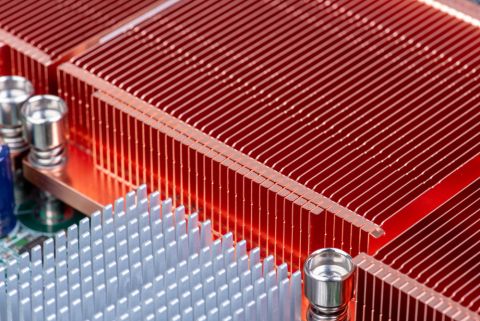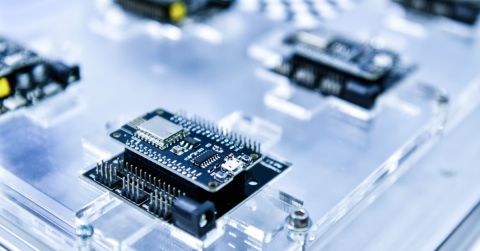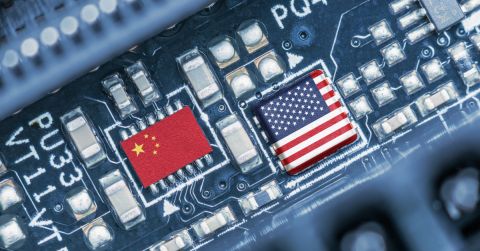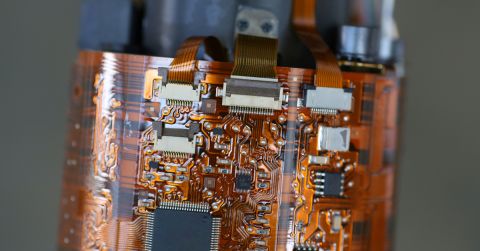Automotive and AI: Two Industries Fuel the Capacitor Boom

Emerging technologies are taking over every aspect of consumers’ lives, and a multitude of business functions.
With everything turning digital, the demand for capacitors for high-powered applications is growing exponentially as both cars and computers rely on safe, efficient parts to enable complex functions.
The insurgence of artificial intelligence (AI) influences power needs across various sectors, including data center operations and energy management. The same potential is now present in the automotive sector, particularly as the electric vehicle (EV) market grows and companies depend on intelligent systems to innovate.

Capacitor Demand as a Result of AI
Think of a potential use for AI and, in a few years, it will have arrived. We recognize this and the rapid scalability of new technologies across all industries, which already makes it a staple for running the global economy of the future. This impacts the way that food is produced, mobility networks are managed, and how businesses leverage connectivity.
The capacitor is a core component of power distribution for AI-powered computing—the most commonly used parts are characterized by ultra-high power density and faster transmission speeds. Without this capability, AI is unable to perform real-time data analysis and carry out the resulting actions.
However, capacitor segments were on the rebound in 2023, particularly that of the ceramic kind—or multilayer ceramic capacitors (MLCCs)—that are consistently used by the automotive sector to support electronics and intelligent subsystems integrated into modern cars. As for other industries, there is a significant rise in the use of AI, which is fueling the need for improved power exchange. Some industries include:
- Agriculture - AI and machine learning (ML) are delivering greater results in terms of crop production, automating processes such as crop monitoring, soil management, and pest and disease control.
- Healthcare - Leveraging AI for disease identification and personalization of care, as well as some organizational practices to streamline healthcare provision.
- Energy and Utilities - Implementing real-time monitoring and analysis to ensure the most efficient production and consumption of energy.
- Manufacturing and Logistics - Generating lean processes in manufacturing and minimizing the potential for defective products.
When compared to the quantity of capacitors shipped in 2021, supply saw a 34% decrease in 2023 to 1.358 trillion units. Prices, expected to rise in 2023, did so as a result of residual supply chain disruption caused by shortages of precious materials and reduced production capacity among manufacturers. Meanwhile, more powerful and capable technologies are being developed, placing demand on upstream suppliers to hold their end.
All dielectric capacitors used in AI applications are explained here:
- MLCC Capacitors: Commonly used for decoupling and filtering in power management circuits, offering greater stability and heat efficiency with low equivalent series resistance (ESR).
- Tantalum Capacitors: Used in AI circuits where reliability is the primary concern, such as AI accelerators and embedded systems. These provide high capacitance density, stability over a wide range of temperatures, and low current leakage, however, they can also be more costly than more frequently used ceramic capacitors.
- Polymer Capacitors: Where low ESR is the main priority, polymers are used. Again, these can be costly compared to their ceramic counterparts.
- Electrolytic Capacitors: These can complement systems that require regular large load spikes. As such electrolytics are used in AI-supporting GPUs or power delivery systems, and makes them useful for EV battery systems.
- Film Capacitors: While less common in AI hardware, film capacitors are used in certain power conditioning applications, power smoothing in AI accelerators, energy storage at high frequencies, energy management in AI-enabled robotics, and high-voltage filtering electrical disturbances in AI medical devices.
Capacitor Demand in the Automotive Sector
The automotive industry is at a pivotal point, whereby the major players and newcomers in the industry are part of its most profound transformation yet. With electrification comes an entirely new driving experience for both consumers and fleet operators, all thanks to EVs (accounting for a potential MLCC CAGR of 49.43%) and the developing safety measures, advanced technologies to maximize driving efficiency, and the ease of connectivity between vehicles.

The increasing capacitor demand from the automotive sector is a response to the use of AI in various functions, including:
- Advanced Driver Assistance Systems (ADAS) - The ability of a car to analyze the surrounding environment and support the driver with lane assistance, adaptive cruise control, hazard perception, and steering. This integrates a number of modern technologies: cameras, radar sensors, and Light Detection and Ranging (LIDAR).
- Vehicle-to-vehicle (V2V) - A wireless exchange of data between cars, in real-time, which is currently being developed and implemented to allow vehicles to communicate to improve road safety and traffic efficiency.
- Vehicle-to-everything (V2X) - Building on connectivity, companies are working with digital innovators to develop solutions that allow data sharing between cars and the surrounding infrastructure.
AI and ML are essential for enabling these functions, which is why, inevitably, car companies are equally invested in the state of the capacitor supply chain—as the capacitor provides adequate energy transfer capabilities to open the floor for more advanced systems.
In 2024, the MLCC market size will grow to US$2.94 billion with a forecasted increase (supported by trends from 2017 onwards) to US$15.36 billion in 2029. Developments in ADAS technology influenced a projected CAGR of 39.26% for Class 2 dielectric capacitors due to their energy efficiency and stability.
In order to balance EV range (distance) while powering smart technologies, battery makers and car marques demand capacitors in large quantities, but also quality parts that can withstand faster charging and discharging of electricity.
Is the Capacitor Supply Chain at Risk?
Manufacturers are looking to steady the balance between the supply and demand of capacitors, which is swayed towards the latter as a result of AI advances and the world’s most impactful shift in automotive technology. The supply of parts is hindered by many of the usual challenges—one of the most prominent being a materials shortage.

Further, MLCC manufacturers currently operate at a reduced capacity as low as 50%, which also impacts industries beyond automotive. For example, telecommunications is a critical sector forming a base for services like V2X. Not only do industries need capacitors to build their products, but also to allow partnering industries to develop the infrastructure and communications networks required to enable the highest degrees of AI functionality.
Alongside these developing sectors, the demand for capacitors aligns with the need to reduce energy consumption in high-power scenarios. As countries seek out new ways to implement digital technologies into everyday life and commercial functions, the capacitor is a critical component for lean energy consumption in the process.
Overarching Goal: Energy Efficiency and Technical Performance
The global climate and innovation have reached an inflection point, which is driving vast changes in automotive and increasing the use of AI. Proper energy management is key to integrating incredibly powerful hardware and software.
While these evolving digital aids offer societal and environmental benefits, their power demands make energy consumption a core principle in their development. This will increase demand for progressive capacitors to boost performance while reducing energy use and costs.
Industries are also adopting AI for commercial benefits, cost reduction being one area. For consumers, energy performance could also influence their take-up of EVs, guided by manufacturers as they balance AI features with affordability.










